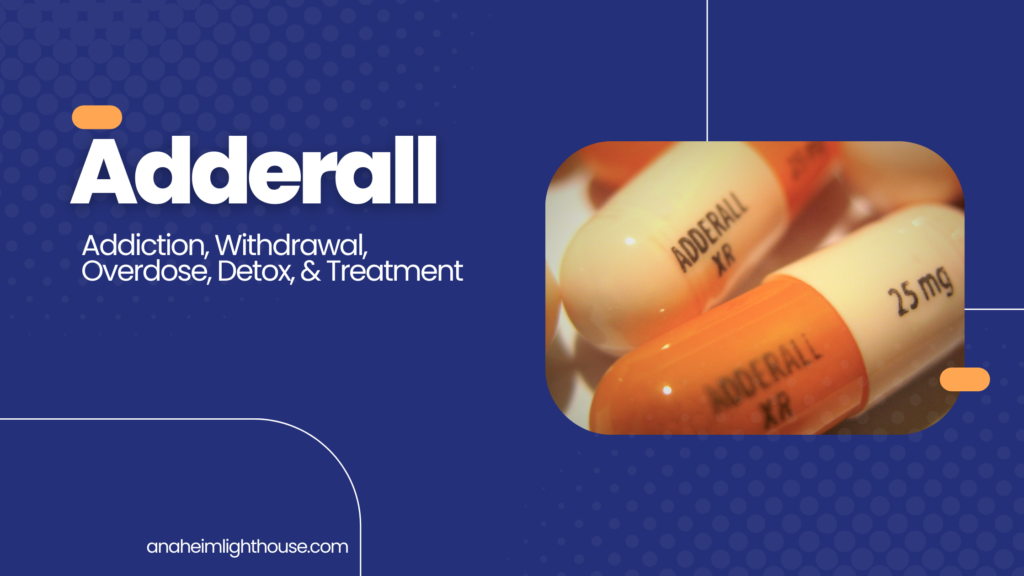Adderall: Side Effects, Addiction, Withdrawal & Treatment
Adderall is a psycho-stimulant medication most commonly prescribed to treat attention deficit/hyperactivity disorder (ADHD). However, the abuse of Adderall is becoming more and more common among college students and young professionals who are seeking a competitive edge.
The use of Adderall can lead to serious side effects including addiction, withdrawal, and even overdose. In this post, we will explore the dangers of Adderall abuse and what you can do if you or a loved one is struggling with an addiction to this medication.
What is Adderall?
Adderall is a brand name for the medication amphetamine-dextroamphetamine. Amphetamines are central nervous system stimulants that increase alertness, attention, and energy. Dextroamphetamine is the more potent form of amphetamine and produces more pronounced effects.
It is one of the most abused college campus drugs to help students study during exams. This prescription drug is a product for the synthesis of amphetamine and dextroamphetamine. Both ingredients have the effect of improving the messaging system in the brain.
This medication is also known in the streets by the following names: beans, double, uppers, speed, pep pills, study drug, bennies, and more.
What Does Adderall Look Like?
In terms of physical appearance, this drug can be in capsule or tablet form having various strengths: 5 mg, 7.7 mg, 10 mg, 12.5 mg, 15 mg, up to 30 mg. The difference in physical appearance can be seen in its color, pill imprint, and shape.
For instance, a 5 mg tablet has an off-white color, no pill imprint, and a round shape. While a 10 mg tablet is blue, the pill imprint is AD10 or DP10, and the shape is round.
Aside from that, this drug also has an extended-release formulation which is in capsule form. For instance, 5 and 10 mg capsules of this type have a blue color and a pill imprint of ADDERALL XR 5mg/10mg.
What Is Adderall Used For?
Adderall is most commonly prescribed to treat attention deficit/hyperactivity disorder (ADHD). It enhances the ability of the patient to concentrate. It is also used for narcolepsy, which is a sleep disorder that causes excessive daytime sleepiness.
A person cannot readily take this medication without a prescription from trusted medical personnel. Furthermore, this medication is not prescribed to individuals having the following conditions: a history of drug abuse, intake of monoamine oxidase, agitation, glaucoma, unhealthy thyroid, high blood pressure, and any heart-related disease such as clogged arteries.
How Does Adderall Work?
Adderall is a psychoactive drug that works on the central nervous system. It increases alertness and concentration. How exactly does Adderall work?
The active ingredient in Adderall is an amphetamine, which is a stimulant. Amphetamines work by increasing the activity of certain neurotransmitters in the brain, including dopamine and norepinephrine. This increased activity leads to improved mental functioning, making it easier to focus and pay attention.
Amphetamines also have the effect of suppressing appetite, which can lead to weight loss. This is one of the reasons that Adderall abuse is becoming more common in people with eating disorders.
How Long Before You Can Feel the Effects of Adderall?
It usually takes around 30 minutes to an hour for the effects of Adderall to be felt. For people who do not have a tolerance to the drug, the onset of action will be more rapid and intense.
However, for those who are tolerant of it, the initial effects will be less pronounced but they will last longer. When tolerance is higher, you may need a higher dose of the drug to feel the desired effects.
How Long Does Adderall Stay In Your System?
Many factors play a role in how long Adderall stays in your system. These include the dose you took, how often you took it, your metabolism, and whether you have any other medical conditions.
On average, drug tests can detect the drug in the system for the following period:
Urine Test – 72 to 96 hours
Saliva Test – 20 to 50 hours
Blood Test – 24 to 48 hours
Hair Test – 1 to 3 months
What are the Short and Long-term Effects of Adderall?
Short-term effects of Adderall include a rapid heartbeat, extreme weight loss, and fast breathing patterns. These side effects are the result of the stimulant properties of the drug.
When taken for long periods, there are also long-term effects which include hallucinations, seizures, stomach pains, and heart attacks.
Is Adderall Addictive?
Yes, Adderall is highly addictive. The Drug Enforcement Administration (DEA) classifies it as a Schedule II Controlled Substance. This means that it has a high potential for abuse and may lead to severe psychological or physical dependence.
The abuse and addiction to this drug can be rooted in different reasons. The top five reasons for the abuse of it are the following: reducing weight, studying, enhancing sports performance, pleasure, and being awake.
Even though this drug has a lower impact compared to methamphetamine, it is still dangerous because of its high addictive potential and high accessibility to abusers.
Addiction to this drug can lead to serious health consequences. Its severe side effects can be summarized into three: mental disease, stunted growth, and death from heart failure.
What Are the Withdrawal Symptoms?
There are several possible withdrawal symptoms associated with Adderall abuse. These can include depression, irritability, changes in mood, difficulty sleeping, fatigue, and overall feelings of anxiety or restlessness. In severe cases, some patients may also experience hallucinations or delusions.
Withdrawal from Adderall can be both physically and psychologically difficult, so it’s important to get professional help if you’re struggling with abuse or dependence on this drug.
What Causes Adderall Overdose? Signs of an Overdose
Many users underestimate the potency of Adderall and accidentally take too much of the drug. This can lead to an overdose, which can be potentially fatal.
Signs of an Adderall overdose include:
- Rapid heartbeat
- High blood pressure
- Chest pain
- Shortness of breath
- Agitation
In addition, this drug is dangerous because of the high risk of taking it in combination with other substances. The most common substance taken along with Adderall includes cocaine, alcohol, and marijuana. The overall impact of this action is a magnified euphoric feeling and unbalanced behavior.
What Should You Do If Someone Is Overdosing?
If someone you know is overdosing on Adderall, it’s important to call emergency services right away. Overdose is a medical emergency and requires immediate medical attention.
Do not try to make the person vomit or do anything else on your own. Stay with the person until help arrives and be prepared to give as much information as possible to the responding medical professionals.
How Do You Treat Adderall Addiction? Detox & Treatment
Professional treatment is always the best way to treat addiction of any kind. This is because addiction is a complex disease that affects both the body and mind. Treatment will help you overcome your addiction and learn how to live without drugs or alcohol.
There are many different types of rehab centers, so it’s important to find one that fits your needs. It’s also important to make sure the center has a good track record and employs qualified staff.
Final Thoughts: Addressing Adderall Abuse and Addiction
Adderall addiction is a real and serious problem. If you’re addicted to Adderall, it’s important to seek professional treatment. A qualified detox and treatment center can help you get clean and sober.
It’s not easy to break free from an addiction, but with the right help and support, you can overcome your addiction and start living a healthier, happier life.



